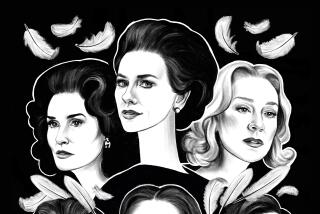Review: The story of ‘Capone’ has been told many times. But never quite as appallingly as this
Here is the tale of Al Capone, a legend told on film time and again for nearly a century and now once more, in all its gruesomeness, in “Capone,” starring Tom Hardy. But the more interesting tale is the story of writer-director Josh Trank, the wunderkind filmmaker who burst onto the scene in 2012 with his found-footage teen sci-fi movie “Chronicle,” which became a surprise hit.
Before the age of 30, Trank was handed the keys to the newest iteration of Marvel’s “Fantastic Four” and was even promised a “Star Wars” spinoff. But then “Fantastic Four” went down in a blaze of reshoots, rumors and rotten reviews, Trank quit “Star Wars” before he could get fired and the young director found himself in the proverbial “director jail.”
The only reason for this contextual windup before getting to the assessment of his new film is to try and understand Trank’s mind-set when he conceived of and wrote this movie. Isolated, rocked by the Hollywood roller coaster and a thorough wringing by the media, he took to a childhood obsession with the famed Chicago gangster and despite all odds got the film made, with a movie star to boot. And so here is “Capone,” which is sort of a giant middle finger, or rather a long wet passage of gas, directed toward the establishment and the powers that be, wrapped up in a depiction of the last days of the gangster’s life, spent in a haze of syphilitic dementia at an estate in Florida.
It’s not enough to say that the English actor Tom Hardy “portrays” Capone; you don’t hire Hardy if you don’t want an actor who will embrace the physical realities of the role with an almost terrifying commitment. Hardy doesn’t “play” Capone, he sweats, grunts and vomits Capone, while caked in old-age makeup, bloodshot eyes darting, mumbling menacingly in Italian. Hardy, never one to pass up the opportunity to experiment with a crazy New York accent, takes his work to new heights, or rather lows, with the gravelly Brooklynese he trots out for the role.
At the age of 47 (looking 87), Capone, or “Fonzo” as his family calls him, is gripped by his violent past as his body deteriorates in the Florida sun. As he regresses physically, equipped with diapers and a carrot cigar by an infantilizing doctor (Kyle MacLachlan), his family tends to his care, while gangsters (Matt Dillon) and FBI agents (Jack Lowden) come sniffing around about the rumors that Capone has a fortune buried somewhere. They’re convinced that his ramblings will reveal a clue or two, but the only information Capone has for them is the aforementioned flatulence, part of a graphic scatological motif that Trank weaves throughout.
Watching this frequently grotesque and narratively meandering movie is a somewhat nightmarish experience, and thereby it successfully evokes Capone’s tortured existence: it traps us within his surreal, blood-soaked flashbacks as he decays slowly and then all at once, in a display of body horror that is operatically Cronenbergian.
“Capone” is an angry, violent and despairing film, without much of a point other than that existence can be angry and despairing and memory is a prison. As a piece of art, entertainment or cultural ephemera, it is indeed bold, but it is significant not for what it says about Capone but, rather, what it says about Trank and the ongoing saga of his career.
Katie Walsh is a Tribune News Service film critic.
'Capone'
Rated: R, for strong/bloody violence, pervasive language and some sexuality
Running time: 1 hour, 43 minutes
Playing: Available via video on demand and virtual cinema release
More to Read
Only good movies
Get the Indie Focus newsletter, Mark Olsen's weekly guide to the world of cinema.
You may occasionally receive promotional content from the Los Angeles Times.










